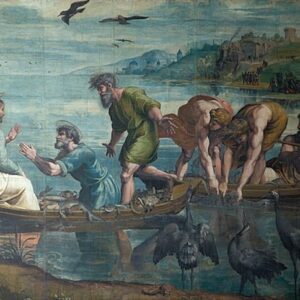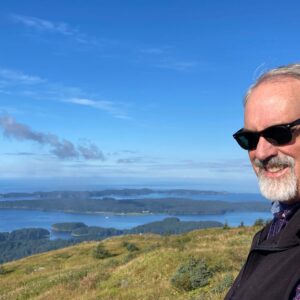During a lesson on dialogue, a writer asked me how one ought to quote God.
“With quotation marks or with italics?” she asked.
I was grateful this was an online course, and not an in-person classroom, because I would’ve been standing at the chalkboard or the whiteboard, the overhead projector or the smart board, and I would’ve said, “I don’t know.” I’ve been in enough classrooms to understand that to not know, is a thing you don’t say. We’ve replaced mystery, doubt, and nuance with, “I can” statements: I CAN hear the Lord. I WILL use italics when I relay His words in my story.
You’re not supposed to teach doubt, and while her question has no easy answer, as writers of faith I think it is one we ask (whether we know it or not) every time we put our pen to paper. How do we render God in our stories? The only response I can offer is to read how other writers have done it.
In a scene in David McGlynn’s memoir, A Door in The Ocean, David and his father are eating Taco Bell sitting on a bench, “overlooking the Cleo Street beach,” when David tells him he thinks he has been called to the mission field. Actually, he’s worried he’s been called to the mission field.
“‘What do you want to do?’ [his father asked].
‘God’s set my hand to the plow,’ I said—and I realized I was quoting my stepmother. I heard its shallowness even as I said it, how completely I did not believe it.
‘Hand to the plow?’ my father said. He cocked one eyebrow as he squirted salsa on his burrito. I’d never been able to lie to him. To other people, yes, but never to him. He knew my truest self and where it had come from. With him I could swear without worrying he’d rebuke me with a quote from Ephesians. ‘You don’t have to be a missionary to serve God,’ he said. ‘There are lots of other ways.’
‘I know that,’ I said.
‘So, what do you really want to do?’ he asked.
‘Go back to school,’ I said. ‘Study. Write.’ What I did not say, though I believe I could have and my father might have understood what I meant, was: I want a normal life, a life that isn’t always defined by reaping and sowing, spreading the Word, growing the kingdom.
‘Your own place to live?’
‘Absolutely,’ I said.
‘There’s your answer,’ he said.
Seagulls circled in the clear sky, squawking for crumbs. A pelican dive-bombed into the ocean and flapped away with a fish in its mouth. The sun was warm on my face, and that warmth took hold of my body, a limb at a time, loosening each joint and muscle as it moved down my spine—a warmth I knew immediately was relief.
My father pointed the bitten end of his burrito at my Volkswagen. The gearbox was held together with wire, the dashboard lights were shot, and the windshield leaked in the rain. ‘Set your hand to that plow,’ he said, chewing, ‘and push that piece of junk off a cliff.’”
God doesn’t speak directly here, and in fact the places He’s referred to are in places of doubt and challenge. However, if it is true God works through us, then we can read this passage and sense a communion of sorts: David unfolds his taco from its wrapping just before he begins the conversation, his father challenges him as he puts salsa on his burrito. Once a bite has been taken, the scene ends with a benediction.
Something similar happens in many churches at communion: before partaking in the elements we confess a thing or two, the pastor breaks the bread and pours the wine, offering us nourishment in what’s been broken. Finally, after we’ve eaten and drunk the pastor sends us forth, inviting us to consider a new way of living.
God might not be literally speaking in the scene of David and his father, but God’s presence surrounds it, paralleling a sacred ritual of Christian faith.
In an essay in the collection, Shouts and Whispers, Doris Betts opens with an anecdote about a time Flannery O’Connor had to answer the (dreaded) question: Why do you write?
“When Flannery O’Connor was asked before one of her Southern audiences, ‘Why do you write?’ she promptly answered, ‘Because I’m good at it.’ People recoiled; in our religion, modesty is thought to be automatically transmitted with the X chromosome. But Miss O’Connor, a committed Catholic, was not being arrogant. She hastened to add that she took seriously the parable of the talents in Matthew 25, so if she wrote fiction because she was ‘good at it,’ that answer grew out of her conviction that every person’s talent was a gift, that each of us has a responsibility for using that gift as well as we can and by that use returning it to the Giver at least as large as ever—possibly larger if service has helped it to increase.”
Here, Flannery O’Connor is not quoting God, but she is responding to what she understands and has interpreted from reading His words: we are to work to develop whatever talent we’ve been given, and we are to offer what we have to the world. Which is more important: that we proclaim what we heard, or live it?
“God is always beyond and unexpected,” writes Michael Card in A Sacred Sorrow. Even if we hear God directly, the situation is confusing, overwhelming, dire even. Job, for example, a person Card explores in his book, spends a significant amount of time crying out to God and hears nothing until Chapter 38, when God finally speaks, but it is not to give Job comfort or healing or peace:
“What is the way to the place where the light is distributed, or where the east wind is scattered upon the earth?” (38:24) “Do you know when the mountain goats give birth?” (39:1) “Will you even put me in the wrong?” (40:8)
For four chapters God questions Job until he says, “Therefore I have uttered what I did not understand, things too wonderful for me, which I did not know.”
Card writes that Job is about “the mystery of God.” It is mystery that writers ought to concern themselves with. How do we render onto paper not what we hear but what we cannot hear? What is the story for what we do not know? I believe we look for it in doubt, fear, and uncertainty.
I believe we experience that mystery in the questions, and not the answers, the silence and not the noise; the conversation with our father over a fast-food meal while seagulls soar above waiting for whatever remains.
Callie Feyen lives in Ann Arbor, Michigan and is the author of two books: The Teacher Diaries, and Twirl, both published by TS Poetry Press. She holds an MFA in Creative Nonfiction from Seattle Pacific University. Callie writes for Coffee+Crumbs, TS Poetry Press, and the Banner. Find more of her writing at http://www.calliefeyen.com





